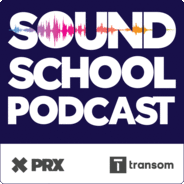Every once in a while, I think HowSound should focus solely on interviewing. To heck with sound design, writing, ethics, tracking, and the like. Just focus on “the backstory to great radio interviewing.”
Why? Because interviewing is how radio producers mine. It’s how we collect the raw material for our work. The better the interviewing, the better the tape. The better the tape, the better the story.
I mean, sure sloppy writing can kill stellar interview tape.
Same with bad production. Conversely a
bad interview can be saved by rock solid writing. But really, if you nail your
interview, the rest will come easy. Okay. Not easy, but easier. And the story
the tape is based on will likely be more satisfying.
Put another way, interviewing is the keystone of audio
storytelling.
That’s why it’s important to examine the work of the best practitioners and Cathy FitzGerald is just that — one of the best. She possesses an uncanny ability to capture “humans being” in her interviews. And she approaches it in unusual ways with her penchant for recording interviews in scene; her use of participant observation, which is a fancy way of saying she doesn’t just ask questions, she gets involved; and her use of props to prompt conversation. On this episode of HowSound, Cathy chats about those approaches and we hear extended examples of her work.
As a bonus, during our chat, Cathy turned the tables and
asked me questions about
interviewing. And that led us to talk about our weaknesses and what we both
would like to improve and to this positively lovely analogy for interviewing —
weeping with one eye.

FeatureLeben & Liebe
Sound School Podcast Folgen
The Backstory to Great Audio Storytelling, hosted by Rob Rosenthal, for Transom and PRX.
Folgen von Sound School Podcast
362 Folgen
-
Folge vom 14.05.2019Getting Inside Someone Else’s Skin
-
Folge vom 30.04.2019Eight Things I Like About 10 Things That Scare MeOn this episode, the convention-busting production choices of "10 Things That Scare Me."
-
Folge vom 16.04.2019NuggetsSometimes, there's just too much good work to feature on HowSound. To solve the problem, from time to time I feature a slew of ear-catching clips on one episode. On this episode, work from Believed, 99% Invisible, This American Life, and Threshold.
-
Folge vom 02.04.2019How Sruthi TracksAt a school where I taught radio, in the mic booth, there was a photo of Studs Terkel hanging on the wall. Under it, someone wrote “Talk to Studs.” The picture was there to help with tracking. Narration will sound more conversational if you pretend you’re talking to Studs, the thinking went. After all, that’s the goal, right? To track like you’re just talking to someone. Hanging up a picture and talking to it may be a good (and slightly weird) first step toward tracking naturally, Sruthi Pinnemaneniof Reply Alltakes things a whole lot further because she’s driven to avoid sounding like she’s reading something written. She very much wants listeners to fall into a story because her voice sounds unaffected and genuine. “(At Reply All) we try to track in a way that is closer to ‘I’m telling a story to somebody,'” she says. “When we’re tracking, we almost always have a producer or someone in the room where we’re trying to recreate that feeling of ‘I’m here and I’m feeling the excitement and joy that I know exists in this story.'” She says it’s not just a matter of talking to that person in the room. They help, too. They offer feedback, of course. But, they also play tape. Sruthi listens to a quote in her story then, right as it finishes, she narrates. “The tape always carries a certain kind of emotion,” she explained to me. “Either you’re surprised by what the person is saying or what the person is saying makes you laugh. And so you want the tracking, the line that you’re saying out of it, to carry that emotion.” What else does she do? Sruthi lays it out in this episode of HowSound.
